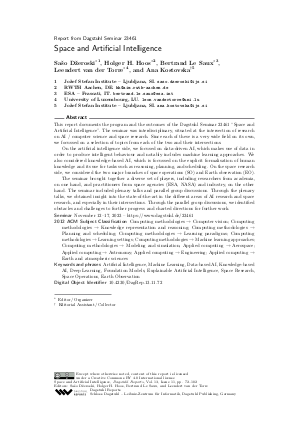Space and Artificial Intelligence (Dagstuhl Seminar 23461)
Authors Sašo Džeroski, Holger H. Hoos, Bertrand Le Saux, Leendert van der Torre, Ana Kostovska and all authors of the abstracts in this report
-
Part of:
Issue:
Dagstuhl Reports, Volume 13, Issue 11
Part of: Volume: Dagstuhl Reports, Volume 13
Part of: Journal: Dagstuhl Reports (DagRep) - License:
 Creative Commons Attribution 4.0 International license
Creative Commons Attribution 4.0 International license
- Publication Date: 2024-04-19
File

PDF
DagRep.13.11.72.pdf
- Filesize: 2.19 MB
- 31 pages
Document Identifiers
Subject Classification
ACM Subject Classification
- Computing methodologies → Computer vision
- Computing methodologies → Knowledge representation and reasoning
- Computing methodologies → Planning and scheduling
- Computing methodologies → Learning paradigms
- Computing methodologies → Learning settings
- Computing methodologies → Machine learning approaches
- Computing methodologies → Modeling and simulation
- Applied computing → Aerospace
- Applied computing → Astronomy
- Applied computing → Engineering
- Applied computing → Earth and atmospheric sciences
Keywords
- Artificial Intelligence
- Machine Learning
- Data-based AI
- Knowledge-based AI
- Deep Learning
- Foundation Models
- Explainable Artificial Intelligence
- Space Research
- Space Operations
- Earth Observation
Metrics
- Access Statistics
-
Total Accesses (updated on a weekly basis)
0PDF Downloads0Metadata Views
Abstract
This report documents the program and the outcomes of the Dagstuhl Seminar 23461 "Space and Artificial Intelligence". The seminar was interdisciplinary, situated at the intersection of research on AI / computer science and space research. Since each of these is a very wide field on its own, we focussed on a selection of topics from each of the two and their intersections. On the artificial intelligence side, we focused on data-driven AI, which makes use of data in order to produce intelligent behaviour and notably includes machine learning approaches. We also considered knowledge-based AI, which is focussed on the explicit formalisation of human knowledge and its use for tasks such as reasoning, planning, and scheduling. On the space research side, we considered the two major branches of space operations (SO) and Earth observation (EO). The seminar brought together a diverse set of players, including researchers from academia, on one hand, and practitioners from space agencies (ESA, NASA) and industry, on the other hand. The seminar included plenary talks and parallel group discussions. Through the plenary talks, we obtained insight into the state-of-the-art in the different areas of AI research and space research, and especially in their intersections. Through the parallel group discussions, we identified obstacles and challenges to further progress and charted directions for further work.
Cite As Get BibTex
Sašo Džeroski, Holger H. Hoos, Bertrand Le Saux, Leendert van der Torre, and Ana Kostovska. Space and Artificial Intelligence (Dagstuhl Seminar 23461). In Dagstuhl Reports, Volume 13, Issue 11, pp. 72-102, Schloss Dagstuhl – Leibniz-Zentrum für Informatik (2024)
https://doi.org/10.4230/DagRep.13.11.72
BibTex
@Article{dzeroski_et_al:DagRep.13.11.72,
author = {D\v{z}eroski, Sa\v{s}o and Hoos, Holger H. and Le Saux, Bertrand and van der Torre, Leendert and Kostovska, Ana},
title = {{Space and Artificial Intelligence (Dagstuhl Seminar 23461)}},
pages = {72--102},
journal = {Dagstuhl Reports},
ISSN = {2192-5283},
year = {2024},
volume = {13},
number = {11},
editor = {D\v{z}eroski, Sa\v{s}o and Hoos, Holger H. and Le Saux, Bertrand and van der Torre, Leendert and Kostovska, Ana},
publisher = {Schloss Dagstuhl -- Leibniz-Zentrum f{\"u}r Informatik},
address = {Dagstuhl, Germany},
URL = {https://drops.dagstuhl.de/entities/document/10.4230/DagRep.13.11.72},
URN = {urn:nbn:de:0030-drops-198454},
doi = {10.4230/DagRep.13.11.72},
annote = {Keywords: Artificial Intelligence, Machine Learning, Data-based AI, Knowledge-based AI, Deep Learning, Foundation Models, Explainable Artificial Intelligence, Space Research, Space Operations, Earth Observation}
}
